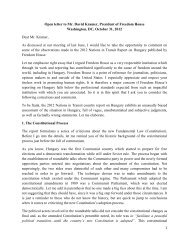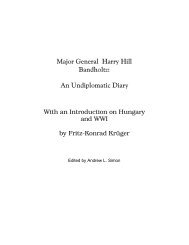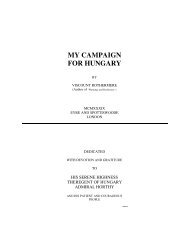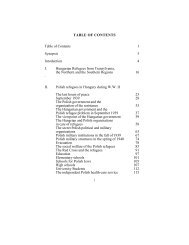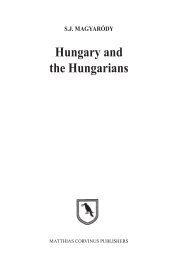The Fate of Western Hungary 1918-1921 - Corvinus Library ...
The Fate of Western Hungary 1918-1921 - Corvinus Library ...
The Fate of Western Hungary 1918-1921 - Corvinus Library ...
Create successful ePaper yourself
Turn your PDF publications into a flip-book with our unique Google optimized e-Paper software.
Paris Peace Conference rejected it – in the fall <strong>of</strong> <strong>1921</strong>, it held out for the<br />
possible creation <strong>of</strong> some sort <strong>of</strong> a Czechoslovak-South Slav corridor in the<br />
west <strong>of</strong> Trans-Danubia. As well, the imminent danger that, in the interest <strong>of</strong><br />
retaining <strong>Western</strong> <strong>Hungary</strong>, Austria would yield to the pressure exerted by<br />
Beneš. At this time, Beneš was attempting to draw Austria into an alliance, as<br />
the fourth county <strong>of</strong> the Little Entente. His plan was, through the support <strong>of</strong><br />
Czechoslovakia for the annexation <strong>of</strong> Burgenland to Austria, to gain Austria’s<br />
rapprochement toward the Little Entente, possibly to create an alliance. Thus,<br />
the political and military ring around <strong>Hungary</strong> would be completed in the<br />
West. 465<br />
<strong>The</strong> Venice Protocol <strong>of</strong> October 13 made it the responsibility <strong>of</strong> <strong>Hungary</strong> to<br />
proclaim to the entire population that: “An equitable agreement has been<br />
reached and, thus, all Hungarians are called upon to observe this agreement as<br />
their most patriotic duty.” A notice is to be made to the rebels that: “Arms are<br />
to be laid down immediately under threat <strong>of</strong> the most serious penalty” and nonresidents<br />
<strong>of</strong> <strong>Western</strong> <strong>Hungary</strong> should immediately leave the area. Within ten<br />
days, the same holds for civil servants and serving or retired <strong>of</strong>ficers. Those<br />
who comply with the notice will not be punished for acts committed during the<br />
insurrection, and will get a general amnesty. <strong>The</strong> latter, however, does not<br />
extend to ordinary crimes committed. Students who took part in the uprising –<br />
also within ten days – are responsible to show up at their schools or academies,<br />
else forfeit their semester. Those who continue to support the rebels will be<br />
punished to the fullest extent <strong>of</strong> Hungarian law dealing with illegal recruiting.<br />
<strong>The</strong> deadline for the previous decrees is three weeks. When the affected area<br />
was evacuated by the rebels, Austria is to take possession. At the instructions <strong>of</strong><br />
the Italian Foreign Minister, the Entente will send forces to Sopron and hold the<br />
plebiscite; first the city, then the surrounding area but the final result will be as<br />
the combined result <strong>of</strong> the two. <strong>The</strong> protocol defined exactly the boundary <strong>of</strong><br />
the plebiscite: the semi-circle <strong>of</strong> Fertőrákos–Sopron–Ágfalva–Harka–Kópháza–<br />
Nagycenk, also Balf, Fertőboz and Sopronbánfalva, nine settlements in all.<br />
Finally, Austria and <strong>Hungary</strong> committed themselves to abide by the results <strong>of</strong><br />
the referendum. Eight days after the announcement <strong>of</strong> the results, the affected<br />
territory is to be handed over to the entitled country. 466<br />
<strong>The</strong> day before the signing <strong>of</strong> the Venice Protocol, PM Bethlen specifically<br />
obliged himself in a separate memorandum to send in the Hungarian military if<br />
the rebels do not withdraw from <strong>Western</strong> <strong>Hungary</strong>. This undertaking, until its<br />
possible use, was not to be made public. On October 13, Bethlen and Toretta<br />
made another secret agreement. In it, the Italian Foreign Minister agreed to use<br />
all his influence to sway the Entente committee to be cognizant <strong>of</strong> Hungarian<br />
claims when deciding on the border definition. Bethlen reported on the Venice<br />
dialogue and the two secret agreements at the Cabinet meeting held on October<br />
465 Ádám, Magda: A kisantant és Európa 1920-1929 [<strong>The</strong> Little Entente and Europe<br />
1920-1929]. Budapest, 1989, pp. 126–127; Halmosy, 1983, op. cit., p. 186.<br />
466 Halmosy, 1983, op. cit., pp. 179-183.<br />
183




